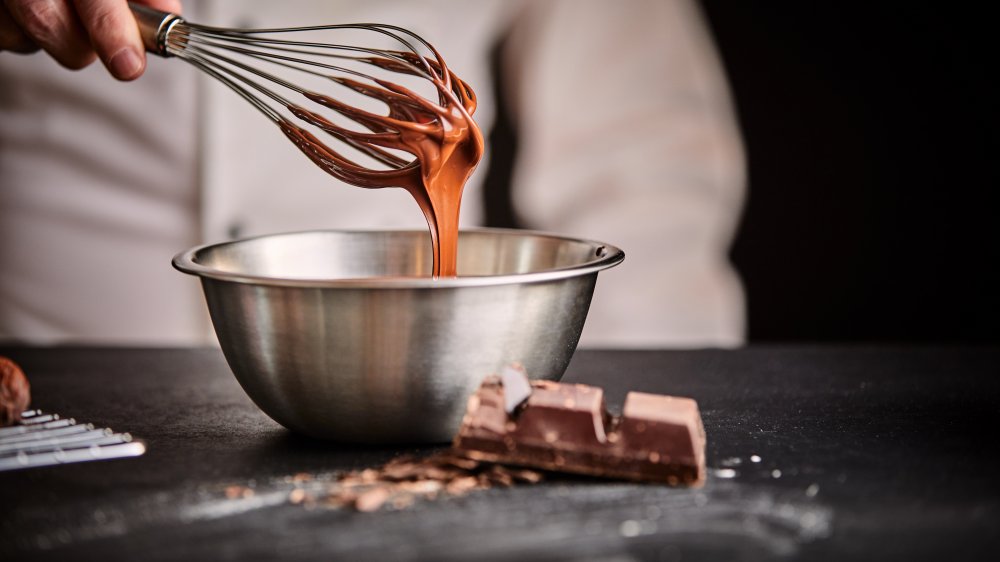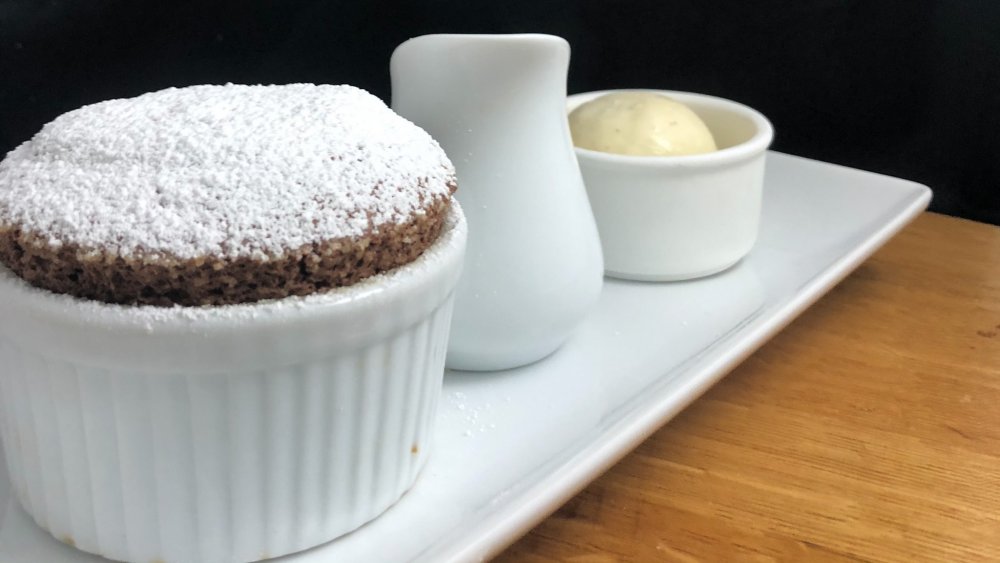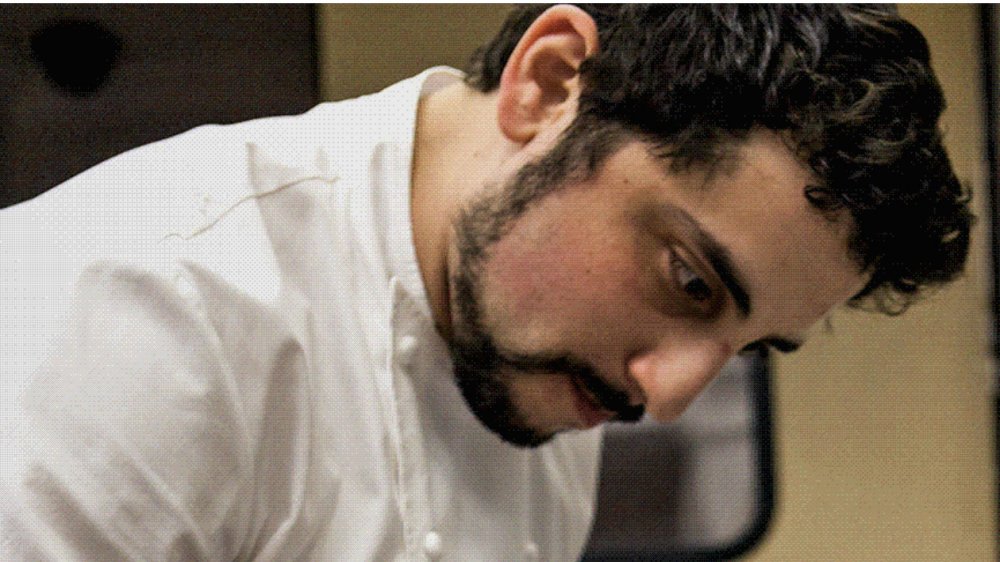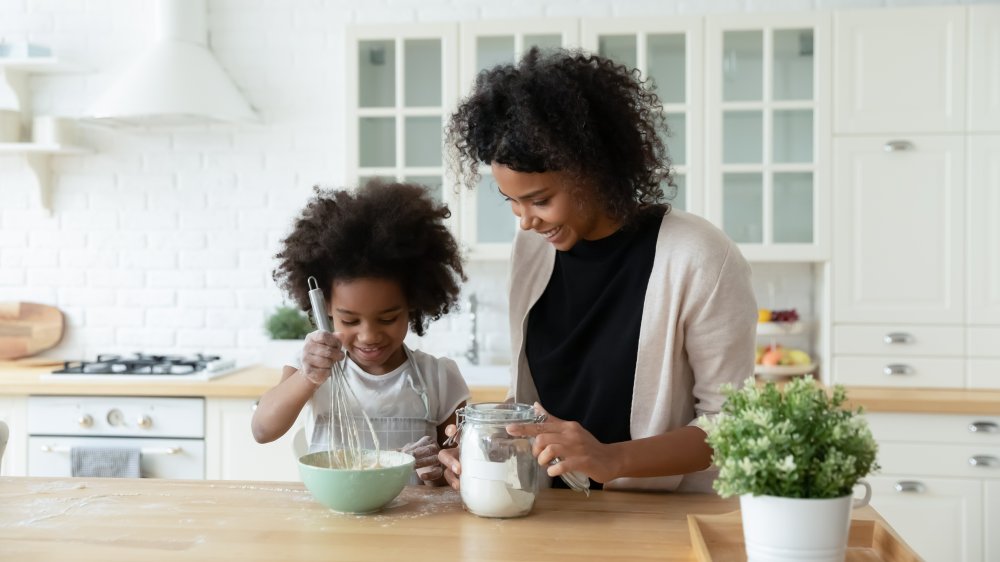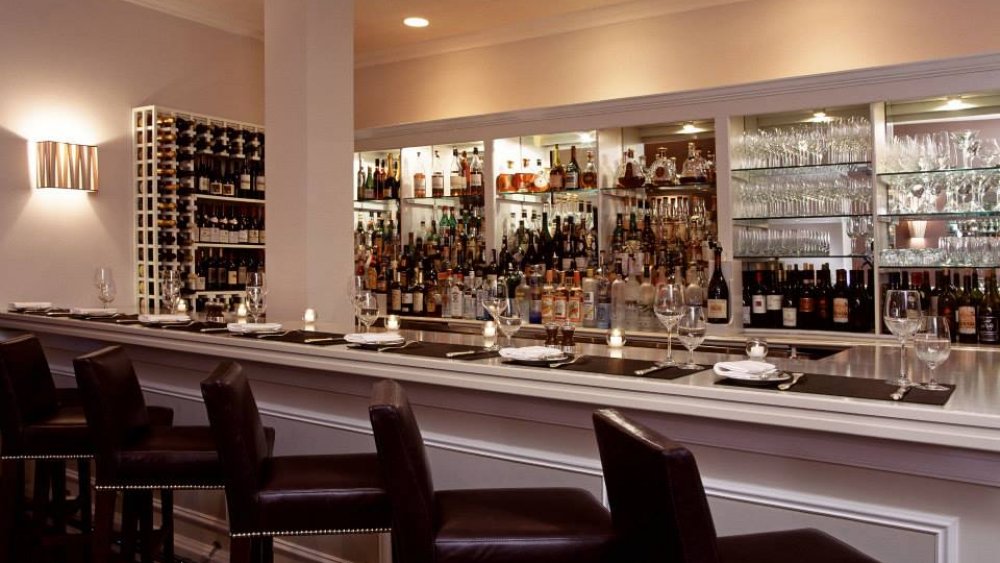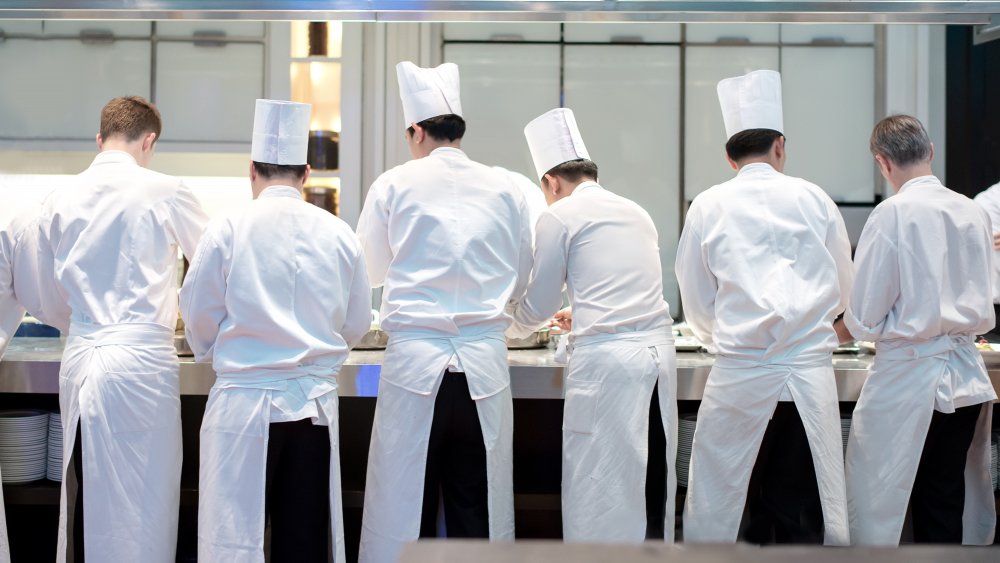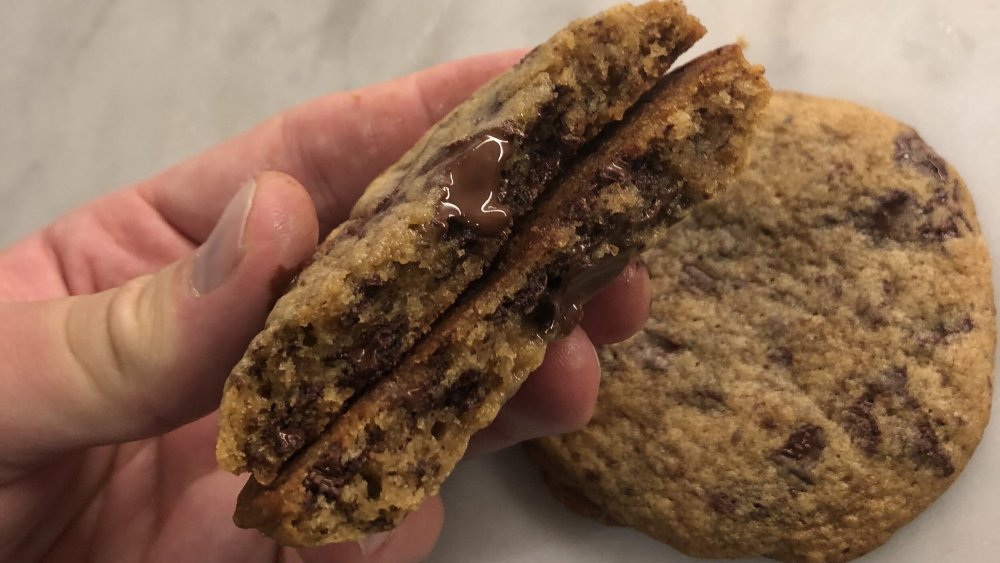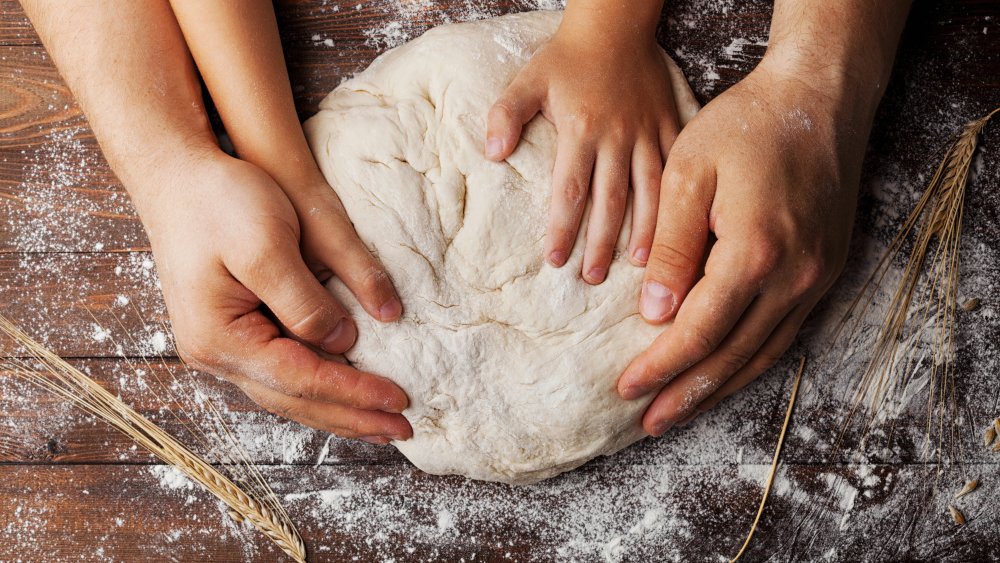Pastry Chef Daniel Kleinhandler On Michelin Stars, Baking Mistakes, And More - Exclusive Interview
Whether it's a basic brownie, or a champagne-infused truffle served with a swizzle of this and a dollop of that, dessert is the ultimate way to treat yo' self. Dining out has gotten trickier in recent months, though, which means we're more likely to be enjoying the brownies than the truffles these days. But it doesn't have to be that way! So says Michelin-award winning chef Daniel Kleinhandler, who served as executive pastry chef at Bar Boulud, Aureole, db Bistro Moderne, Picholine, The Clocktower, and Boulud Sud, before opening his own own pastry company, sugar, butter, chocolate, earlier this year. With the right mindset, according to Kleinhandler, we can all go beyond the brownie and take on truffles, cakes — even a soufflé.
In fact, so passionate is Kleinhandler that soufflés are within our reach, that he recently taught the recipe to in a virtual cooking class through CocuSocial, "a live virtual experience that allows you to cook along with world-renowned chefs and ask questions in real time." In an exclusive interview with Mashed, Kleinhandler explained how soufflés are achievable, and the reason why we do sometimes screw up our efforts at baked goods. Kleinhandler also shared what it's been like for him to rise from 14-year-old unpaid kitchen assistant, to one of the most well-regarded bakery chefs in the world... and what he really thinks about Michelin stars.
Why we've been wrong all this time about soufflés
The recipe you demonstrated for the CocuSocial class is Dark Chocolate Soufflé & No-churn Vanilla Ice Cream. Why did you choose that recipe?
The whole concept is to be able to teach and give an experience, where it's more than just following a recipe in a book. So when we're picking out the recipes for the classes, we were discussing lots of everything, but they all ended up being dishes or constructs that were like, "Oh my God, that's scary. I can't, I can't do that. How am I going to do that?"
And chocolate soufflé is like the fanciest, French-est, scariest sounding dish you can do. In reality, it's five ingredients, three techniques. None of them are like crazy, crazy difficult. And if you just do the four or five, like little phases, you can get caught and you'd do it right, it's super approachable. And everyone you make that dish will be like, "Oh my gosh."
So that's where when I was talking to people who were at CocuSocial, that's where we kind of ended up — with this master series about the next level of cooking. And for me in my first class, I wanted it to be, this is... executable, but doesn't necessarily seem to be, to see if people can feel like, "Oh my gosh, how can I make chocolate soufflé?" But in reality, "Yeah, you can do this on like Thursday night. It takes 30 minutes. No big deal."
So chocolate soufflé is... easy? Can you demystify our perception of soufflé?
So soufflé is — if you don't know what you're doing and you don't know how to take your time and do the techniques properly — it is [hard]. If you don't stabilize the egg whites enough, they can fall. If you don't know how far to bake it and you get at the point where it's not set yet, that can fall. [You need to learn about] egg yolks and the egg whites... these little things. It's one of the reasons I like these dishes.
It's like, "I'm going to teach you how to make a meringue. Now you understand what a meringue is." Cool. "Can you use the same meringue to make the Baked Alaska tomorrow?" Yes. "Can you use it to dry it out and make meringue cookies?" Yes. But now I've taught you how do that technique. It's a little like, there's lots of points where I can stop and go, "Hey, let's learn this thing because this is not just soufflé, this is baking." This is like "Pastry 2.0"...where you can learn an extractable technique.
So the plan for the class is the chocolate soufflé, which is the main feature. But then also we're going to do a no-churn vanilla ice cream, which is a really easy way that anybody can make ice cream. That's like four ingredients. So, it's super simple. And the last thing we're going to do is make caramel glaze.
So if you have an ice cream machine, you're going to use this as a sauce, which is delicious with a soufflé. And or if you have an ice cream machine, here's a, if you have more than the 10 minutes to make those no churn and you want to make them a little richer, a little bit more exciting, here's another tool and technique you can take and do on your own.
Would you say this is a course that someone who's a beginner to baking should avoid? Or is it something anyone can take?
I mean, I think if you've been in the kitchen and cooked yourself, more than just toast, if you don't know how to turn your oven on, yeah... But why I like this dish, [why] I like these recipes? It's not something that you need five years of cooking or you need to be the best cook in your family. Like this could be two 25 year-olds on a date night who barely know how to work a college kitchen... But it also is something that even my mother — who's one of the best chefs I know, home-cook-wise–[could make]. She was like, "You can make a chocolate soufflé and this amount of time? And I'm like, "Yeah, it's really easy."
So it's something that is approachable and easy enough for any above a level to cook or something. And someone who's not afraid of the kitchen to someone who's a really, really, really good home cook, or a pastry cook level, or an introductory restaurant person. You can be excited about this class because everyone's so scared of soufflé.
Chef Daniel's advice for novice bakers
What is the most difficult type of dessert for a novice to bake?
The most difficult dessert is the dessert they're scared to make. If you walk into a kitchen-like environment, you walk into trying to make baked goods and things like that, and you are scared to do it, you're going to make mistakes. If the dish, especially a soufflé... [has] a procedure, if you act timid towards them, you will fail. I think it's more of the European things, isn't it, that have the fun French names? They're scary and people go into them half-assed, and that's when they fail. So I think the hardest stuff in the kitchen... is when you don't feel confident.
I think that's one of the reasons why I really like this CocuSocial. It's where, it's like — I'm there with you. Other classes, other platforms, I can record on YouTube how to make a soufflé. But if you miss that five second thing that I opened my hand, or you are scared to add the egg yolk to the chocolate, you're afraid you're going to burn the egg yolk or whatever it is, or it gets a little bit too stiff on you cause it got a little cold. No one's there to say, "Hey, actually, let's put it back on the double boiler for five more seconds. You'll be fine." Or, "Just keep on mixing. It looks good. Actually. Don't worry about it."
[It] is more of a hands-on class. Where for me as a chef, one of my favorite things is to teach people — so, I can actually teach you! A YouTube video and a cookbook [are] not going to teach you the same way as this really interactive experience.
What is the biggest mistake people make when they're baking?
Generally speaking, not listening to recipes. So I know a lot of people who are good cooks, and if you're a cook and you don't like ginger, just don't put ginger in the recipe, and you're a good cook and you don't have flank steak, you have strip steak, other than how long it cooks on the stove, it really doesn't make a difference.
In baking, "Oh, I don't want to put that much sugar in there." Well guess what? It's not going to work. It's just not going to work! So people try and alter recipes before they make them before they really know. And not really knowing what each item does — like sugar in a baked item doesn't just make it sweet. It's for texture. It's for stability. It's got multiple layers of purpose. And if you remove it or too much of it, or don't replace it with something else that can act like it, not only is it not going to be sweet, which is probably most people's goal, it's going to be flat. It's going to not be stable. It's going to be crunchy. Why is it not creamy and chewy? These people don't realize the purpose all these ingredients play. And they just like, Oh, I can just substitute it out. It's not cooking, it's science.
There's a lot of good books and stuff to understand why you put things in baking. And then there's like these other classes, like when someone reads my recipe or watches a video I put on my Instagram, they're not going to be able to say, "Can I substitute? I don't, I don't like white sugar and I use Stevia," and I can say, well, in case yes or no, or you have to put it in a food processor first to grind it down. You know, that's one of these cool things about the interactive classes. I can answer those questions, but sometimes [trying to make a recipe] healthier can go to the point where it's no longer dessert. And my feeling on healthy desserts is, make good choices. Don't change it completely like, "put more fruit in," or, "take a little bit of sugar off. Sure. That's fine." Replace it with a little bit of a fake sugar or a lower whatever sugar, fine.
I don't even like diet desserts because people don't get satisfied with them. And then if you have to eat two pounds of a diet dessert to feel satisfied, or you're not satisfied, and four days later, you're still going to get the bad dessert. Why are you making healthy dessert?
I'm a big fan of making brownies and making a pan. Instead of cutting into four-inch brownies, I cut two-inch brownies. So you can eat a really, really, really good brownie. Like, "Oh, I can even have two brownies and it's still a quarter of a half the size of a four inch square," you know? Portion control... and then you're going to be satisfied cause you had your rich chocolate, but then you also are eating enough food that you're not still hungry. Things like that are really the key for me...
If you had to give one piece of baking advice to the Mashed audience, what would it be?
I mean, read the recipe for sure. And make every recipe once before you alter it. So if you see it and you taste it, make it all the way through and [then decide if] you want to change it, to add less sugar or you want to make it strawberry. Unless it's a really direct interchangeable [ingredient], like almonds and hazelnuts. I don't think anybody's going to really know the difference, if you know the recipe. Make it first. Try a small batch. Make it on a day before your dinner party with the right recipe. And then if you want to add something to it, I mean, cooking is about expressing yourself, so I think you should learn the technique and make sure you know the recipe first before you start altering the two too much.
Why the pandemic inspires baking
Why do you think people are baking more during the pandemic?
I think the main reason is time, actually. I always say, when I'm trying to teach my cooks or my sous chefs, how to make a new dish, everyone needs to eat food. Not everyone needs to eat dessert. So if they don't eat dessert, then they don't. If it's not approachable, they're not going to eat it... Everyone needs to eat dinner.
So if you are working a nine-hour job, you go an hour commute to a different area, an hour commute home. You're not baking bread. You're going to go to the store and buy bread. You're not baking cookies at night.
So I think a lot of it comes to the two hours we're saving on commutes, that time. Now I can actually like do something fun or do something extra! Because when somebody's cooking more elaborate meals, some people are doing it for other things. For a lot of people, baking is always something that sounds really cool. And now they're okay using it with their time.
What it was like for Chef Daniel Kleinhandler to win a Michelin star
What was going through your mind when you won a Michelin star?
I had worked at Restaurant Daniel, at Cafe Boulud, at Gilt and Jean Georges. And we all had two, one, three Michelin Stars at the time. But I wasn't in charge at that point. And then when I got to Picholine, they literally lost their star three weeks after I got there, not to my doing because the review had come out before. And that next year, we won it back. And it was more special than if we had gotten the Michelin star, and we had it the year before. That was the one where it was really experiential. We were like, "Wow, me and the team really just got this to happen!"
We earned back something that was taken away from us. And we felt like really the whole year we'd played like the underdog team and had a chip on our shoulder, like "eff them, screw them! We're going to get it back!" And we did.
And so that was what was really cool about it. We got to not only get a Michelin star, which is extreme, but being on a team that went to Michelin star is always life-changing. It's like... the coolest stuff. Winning a Grammy, I'm sure that's what it feels like, but in the food world, for us, it was even more satisfying that ... we thought it was taken away wrongfully from us. And then we got it back.
Was there any strategy you had to winning it back?
I think the team that we had, I think the biggest reason why people don't get Michelin stars is inconsistency. So every day, we opened the doors, we had to be on that level. Like there weren't bad days. You couldn't be like, "hey, we didn't get this fish in"... You had to have good days every day. And it was about coming and putting the right way forward, and putting the effort in every day, even when you didn't have it. I think that's how you get them. I've had great meals, I think that were Michelin star worthy, and the restaurant never gets it. And I feel like it's because you don't know when[the reviewers are] coming, you don't know who they are, and they come and if they've had that bad night, you're not getting it. So it's like every day, delivering at that level.
Do you have any advice for how non-chefs can apply the principle of always being consistent to their everyday life?
I think as I grew up, playing baseball — and one of the things you're taught is, when you're pitching or playing a game, you're not going to succeed every day, but to grind through anyway. I think for me, it's, "okay, there are days I just don't have it." I'm going to get everything I have, but it means I'm sleeping on the train, on the way home. So to speak, to get through it, you got to give it. It's a level of, "I don't have my best stuff today, but if I work 20 percent harder than I normally do, I can still get through and it may not be the prettiest service, but I'll get through the service and will still get the customers what it is."
I mean, it's really about them. And it was really about them. Michelin stars, we tend to get really excited about them, [but] it's really about the guests every night, getting that, what they need. And then eventually if you do what the guests want, you'll get the accolades afterwards.
Chef Daniel Kleinhandler's career path was unusual — and started when he was only 14
What do you think your biggest challenge has been in your career as a professional chef, and what has been your greatest success?
When I was a cook, I started out really young, so I didn't really understand the kitchen and worlds and how the kitchen worked. And it took me a while to get really immersed. I kind of took the European path of being 14 in a kitchen. And in Europe, that's totally normal. And the chefs in the kitchen environment know how to handle that person. So when I was 14, I remember never fitting in and cooks all wanted to go out for drinks. I'd have to pretend, "Oh yeah, I got plans and like whatever." And I couldn't say yes to it, even if I wanted to. And it was a very different feeling. So I actually had to learn how to be in a kitchen in a way that most chefs who come into the kitchen at like 18, 19, don't have the same learning curve.
So that was always a weird growth. But what it did — I think it actually made my success or my successes. I really am a person grower in a kitchen. I love creativity. I love being able to create something. I love giving the guests a great experience and seeing their face when I wow them on something. Those are two of the three greatest things.
The third thing is teaching. And it's one of the reasons why I reached out to CocuSocial, is I wanted to, and we got into conversation was that I miss teaching. I miss growing cooks! So from when I was younger, I didn't really fit in the kitchens. I know how to treat everybody differently. I can't treat this cook or that server the same as everybody else. Cause they had different experiences.
So I learned to relate things more to where, "Hey, where are you from? Are you from this country?" Oh, you go, "this it's kind of like that, but it's different." I hired one of my favorite cooks I ever hired. I hired her out of a high school vocational program. [She was] just 16 years old. People thought I was absolutely out of my mind for hiring a 16 year old at Daniel Boulud restaurant, and expecting her to like work. And I hired and I paid her salary. She wasn't working for free.
And I met her and she had this energy, and she tried so hard, and I was able to be in her shoes and know how to speak to her. I know not to push her too hard. Cause she's 16. I was 16 at a Michelin star restaurant, being yelled at by angry French people!
And I know [my mentors], who my wife's still close with, who I still respect, were the ones who were like, "yeah, he's an A-hole." But [they] took me under their wing, and really taught me why I was getting yelled at and not just got yelled at. She blossomed into one of my best cooks I've ever had — even before she went to culinary school, even before she graduated high school — because it was the personality. And I was able to help her, where I feel like if I didn't have, as I've experienced, I may not have been able to really relate.
So how did you end up working in a kitchen when you were only 14?
So I'm a big science nerd, and then an artist at the same time. My mom has a science background, a design background, my dad has a science background, and I kind of never really fit into either worlds. I would be bored in class, in AP chemistry, getting a B and doing well [in] a really hard class, but I would be doodling the side. Cause I couldn't keep focusing on all the stuff, and vice versa. And an art class, there wasn't enough structure to it for me to feel comfortable. So I found my way in the kitchen and it was kind of like, "this makes sense to me." And I think part of it was, maybe family trying to like, "Hey, go in the kitchen and get scared out of it. And you won't like it and you'll realize you're wrong." And it ended up being like, "No, this is like where it makes sense."
My uncle had just left the restaurant industry. He's now a real estate agent mogul, whatever. He had restaurants for years. That's how he built his first part of his money. We had a friend and he was like, "You want to go?" I worked there for free! I did the lowest level labor work. And I worked there for one summer when I turned 14. We were convinced I had to get a work permit. I waited until I was 14, literally the day after my birthday, when I was 14, I got, I got the job working for free and I just learned. I loved it. Instead of going to summer camp, after that, my focus was working in kitchens. So I would literally go for free to the best restaurant that would teach me.
I went to work for free at chocolate shops back... before they became laws about you can't work for free in school. [My uncle] sent me to Restaurant Daniel, and I was just a 14, 15, 16 year old kid, like working my butt off, like following the nicest chef in the kitchen who would teach me, and just trying. And I got moved around positively because people [were] like, "We're not paying him, but he's doing as much as anybody else getting paid. He's trying so hard."
I remember working at Daniel and I was working like 55, 60 hour weeks for free, because I wanted to learn. And it wasn't like them keeping me there. "You go home anytime you want, dude, like you already worked your time here." And I'm like, "No, no, no, but you're going about to make that type of chocolate. I haven't made that yet. I want to stand there and watch you!" Or, "Can I cut the stupid strawberries that go onto whatever it was?" I wanted to do whatever it was to get me in that kitchen!
And what was great about it was that that resume that builds up before I even got to culinary school fast tracked me to where I was an executive pastry chef at 22, because I had four years of top-level experience... And I knew before culinary school, I knew how to do half the stuff. Culinary school is really about learning how to do it in structure and how to do it, how to make a business out of it.
Why Chef Daniel Kleinhandler opened sugar, butter, chocolate
What's that been like opening up a pastry company in the middle of a pandemic?
There's always a silver lining in a really awful situation. So, as a chef, you work 70, 80 hour weeks every time. And, I've been talking about a concept for probably seven years and you know, I have a family, [I'm also] trying to have a life outside of work. You come home from a 70 hour week and what are you going to start doing?
So, actually, the pandemic a little bit allowed me the time to actually open a business. But for me, the pandemic is kind of an opportunity to kind of bridge a gap. It's like when restaurants were all closed down, I have a lot of people in our community wanted to still have restaurant- quality items, and restaurant-quality desserts, and there's no access to it.
So to be a source for fun, innovative and delightful desserts is one thing. And then when [business] starts coming back, restaurants aren't going to open with a hundred percent staff. So to hopefully be an opportunity to give restaurants an option, to create desserts and have dessert programs that are still up in the center that they had, eight months ago, without having to hire back a full staff or lose money on desserts. Or a lot of people will just end up at phoning in desserts and putting out really crappy products because they don't have the money to do it. This gives them an alternate option.
What has been the most popular item at sugar, butter, chocolate?
So our flagship item is our bars. So part of what my culinary focus is as a chef is modern, yet approachable, and modern, yet recognizable. Those fast food burgers, when you were five, they're the greatest thing in the world. Like "happy lunch," whatever it's called, it's fantastic at five. And if you have it at 30, it's awful. And so it's to give you food that's approachable and recognizable, but give it to you in a way you've never experienced it.
So a lot of candy and chocolate companies focus on bon-bons and the smalls and petites. Our signature lines are our crunch bars. So it's a candy bar shape. So... it doesn't look like a fancy schmancy bon-bon. It's pretty and gorgeous, but it's not pretentious in that way. We try and base the flavors off of classic flavor combinations, mostly being like childhood memories.
So our best sellers [are] our s'mores bar, where we actually make homemade graham crackers, grind them into a paste. Like you would like a nut butter, melted into the chocolate, and add crunchy layers inside of it, and then set a toasted marshmallow on top of it, and then dip it in chocolate. So it's like about recreating that whole energy of being a kid again. S'mores keep it in a platform approachable to everybody. It's not in a scary, pretentious, "So that's going to cost a lot of money for no food?!" kind of way, and yet elevated and elegant and up to a really exciting thing.
Do you feel like little desserts are kind of pretentious?
I think they have their place, but no one wants to buy that for their house. I really love the tiny little pretentious desserts!. If I'm having, like a tasting menu, I'm like, "I'm sitting there. I want to be wowed. I've had eight courses. I don't want a big dessert." So it has its place. It totally has its place in the world of food!
Do people want to buy that and ship it to their house and eat it after dinner on a Friday night? No, people want to give that as a gift. I mean, it looks, it's cute, but it's not a real thing. So while they have their place and you know, at some point will eventually expand more into bon-bons because people want them, our company's whole mindset was based around with the approachability and a real solid thing as our core. And we can branch out into like littler things — I guess, eventually.
How becoming a dad has changed how Chef Daniel bakes
Of all the things that you bake, what's your favorite thing to bake, and why?
My personal style is modern American with Asian, French and Middle Eastern twists. And I kind of like to use modern techniques and other countries' techniques to recreate French food, American food. It's like French technique and an Asian inspired inspirations and things like that. But to bake now, honestly, has been more like homey stuff because my son loves it. When my son was born, it changed my life a lot then. And then as we're cooking together, when I'm baking at home, that's completely changed from what I would want to do something that's like, elaborate. I'll make macarons for this thing. Cause you know, I can make them. I haven't made macarons at home since he was born because it's about, he wants a chocolate chip cookie. So we make a really, really good chocolate chip cookie, with the double chocolate.
That's the stuff that he's excited to bake. And so that excitement has kind of gone into what I'd like to bake when I'm not at work. But at work, it's always been a modern American.
How old is your son?
He's three.
He's three, so he must love cookies?
He loves cookies, he loves cakes and pies and you know, it's fine. My wife is also a chef. So you know where most kids are, "I'm going to make cookies." He's like saying, "I want to make chocolate cream pie!" Or we watch him cook in the kitchen. He looks like he doesn't have a spatula or just move his pots around. He's shaking them on the fake stove. You know? So it's really fun seeing the little chef version of me.
Is he a picky eater?
Yes and no. He is very decisive as an eater. It's not a picky eater. You see everything and now it's like very clear what you want. You're not going to try certain things. You know you're not going to get them. But he'll try everything. That's the best.
Be sure to reserve your spot in Chef Kleinhandler's next virtual cooking class on CocuSocial, which will be taught on September 24th. This time he's whipping up cherry cheesecake.
